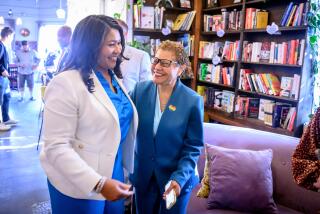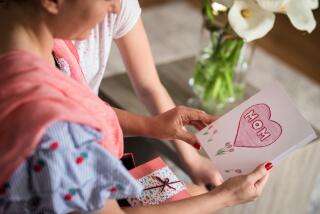Mass Breast-Feeding by 1,128 Is Called a Record
- Share via
BERKELEY — The women and their children, newborns and toddlers, filed into the Berkeley Community Theater on Saturday until more than 1,000 seats in the large auditorium were filled.
A folk singer crooned softly as city officials, including Mayor Shirley Dean, prepared for the tally of nursing mothers and their suckling children. Finally, city health worker Ellen Sirbu started the countdown:
“One, two, three--latch!” Sirbu, organizer of the first Berkeley simultaneous breast-feeding rally, urged the assembled women.
To the obvious relief of many sighing and cooing infants, the mothers swung into action, assertively raising their loose-fitting blouses and connecting child--and in some cases children--to their life-supporting chests, the source of mother’s milk and, from time immemorial, the symbol of things good.
“I could not be prouder that Berkeley is doing this,” said a beaming Dean, looking out at what had to be one of history’s most serene audiences. “Berkeley is used to taking the lead in these kinds of health issues, and we are doing it again.”
When it was over, the women--some of whom came from as far away as Texas and Wisconsin--had easily done what they set out to do.
They broke a reported recent Australian world record for simultaneously nursing mothers and--as network television cameras zoomed in for close-ups--took a major step toward raising America’s consciousness about the many benefits of breast-feeding and the right to nurse in public places.
Top 10 Reasons
One nursing mother carried a placard listing the top 10 reasons for breast-feeding in public.
The list began: “10) Because you are not at home. 9) Because your breasts are ready to explode” and ended with “2) Because your baby is hungry. 1) Because it is not illegal yet.”
Organizers hope the count of 1,128 simultaneously nursing mothers Saturday will be recognized by the Guinness Book of Records and will inspire other American cities to stage their own breast-feeding challenges. Thus, the same city that launched the Free Speech Movement and formed the vanguard in the 1960s anti-war movement might also inspire other places to hold mass demonstrations of simultaneous lactation.
Mollie Peterson, 34, is a massage therapist from Santa Cruz, mother of four children ages 10 years to 19 months.
“All of them nursed, and all of them were home-birthed,” said Peterson. The results, she said, have been remarkable. “None of these kids has ever been sick. And they are all really, really smart.”
As she spoke, the eclectic activities of a Berkeley Saturday swirled around Peterson. On adjacent Allston Way, the Farmers Market, featuring herb booths and stands selling mangoes impaled on sticks, was in full swing. Up the street at the old Elks Building, the Berkeley Psychic Institute was conducting its annual Psychic Faire & Spiritual healing festival.
Emily Roysdon, 31, of Modesto said she came to the event to make a point about the United States’ backwardness in recognizing the benefits of the practice.
“The U.S. has an appallingly low breast-feeding rate,” said Roysdon, whose 4-year-old son and 2-year-old daughter are still nursing. “This is to make people think about breast-feeding as a normal thing.”
The nurse-in was organized by Sirbu, a Berkeley city nutritionist who was inspired by similar mass “breastfests” in Australia, which has one of the world’s highest rates of nursing mothers.
Last week, a group of women at the South Australian Breastfeeding Challenge in Adelaide reportedly set a record of 767 simultaneous breast-feedings as part of World Breastfeeding Week.
“We wanted to make people aware that breast-feeding is the best way to help baby, help yourself and help society,” said Sirbu. “There’s even less pollution, because there are fewer cans of formula in circulation.”
Recent studies have shown that women who nurse have a reduced likelihood of breast cancer. Other studies show that children who are breast-fed are less likely to become obese adults.
Statistics on nursing are somewhat unreliable because they are usually compiled when the mother leaves the hospital, and don’t reveal how long she continues breast-feeding. Nutritionists recommend nursing for at least one year after birth.
Cut in Cancer Risk Seen
According to an article earlier this year in the medical journal Lancet, women in developed countries would reduce national breast cancer rates by 5% if they extended the average nursing period by six months.
According to La Leche League International, a leading promoter of breast-feeding, about 68% of new mothers in the United States are nursing when they leave the hospital.
By contrast, about 95% of Australian mothers are breast-feeding when they go home. Japan and several Scandinavian countries, all with national health-care systems that encourage breast-feeding, have nursing rates of more than 90%.
Despite laws in California and other states protecting the right of mothers to breast-feed in public, nursing mothers still occasionally face prejudice.
In June, 70 breast-feeding mothers staged a nurse-in at the Santa Monica Place mall after a 27-year-old El Segundo woman was told to “cover up” by a security guard.
In this respect, little has changed since Ellen Sirbu nursed her two sons more than 30 years ago. “I remember nursing one of my boys in a restaurant and being told to take him to the restroom,” she said.
In contrast, Sirbu said, many Australian businesses display signs: “Nursing Mothers Welcome Here.”
Of particular interest to the Berkeley organizers is increasing the percentage of African American women and Latinas who nurse their infants.
According to Berkeley nursing event co-chairwoman Kelly Moore, who directs a California Women, Infants and Children program in Oakland, the highest rates of nursing mothers are among white, middle-class women.
Moore said the reverse is true among recent Latino immigrants who come from cultures where the use of baby formula is considered a sign of economic achievement.
When she announced that the Bay Area women had broken the Australian record Saturday, Sirbu urged them not to get smug. “Australia has only 18 million people. We have 285 million, and we have a long way to go to catch up. Next year I want to hold this in the Oakland Coliseum.”
More to Read
Sign up for Essential California
The most important California stories and recommendations in your inbox every morning.
You may occasionally receive promotional content from the Los Angeles Times.













